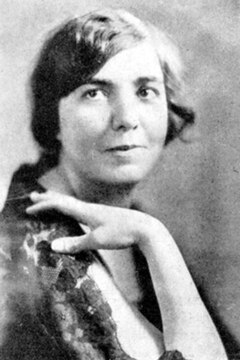Muna Lee (writer)
| Muna Lee | |
|---|---|
 |
|
| Born |
January 29, 1895 Raymond, Mississippi, United States |
| Died | April 3, 1965 (aged 70) San Juan, Puerto Rico |
| Occupation | Poet, translator, activist |
| Genre | Pan-Americanism, Feminism, Detective fiction |
| Spouse | Luis Muñoz Marín |
Muna Lee (January 29, 1895 – April 3, 1965) was an American poet, author, and activist, who first became known and widely published as a lyric poet in the early 20th century. She also was known for her writings that promoted Pan-Americanism and feminism. She translated and published in Poetry a 1925 landmark anthology of Latin American poets, and continued to translate from poetry in Spanish.
A longterm resident of Puerto Rico from 1920 to her death 45 years later, she was an activist in the 1920s and 1930s, working on issues of women's suffrage and equal rights in Puerto Rico and Latin America. Lee worked for more than two decades in cultural affairs for the United States State Department, promoting artistic and literature exchanges between Latin America and the US, as well as other countries.
Born in Raymond, Mississippi in 1895, the eldest of nine children, Lee was the daughter of Benjamin Floyd Lee, "a self-taught druggist" and son of a planter, and Mary Maud (McWilliams) Lee, whose father was a physician. Three of her siblings died in infancy. Her parents encouraged her early interest in literature and art. When Muna was seven her family moved to Hugo, Oklahoma, where her father set up his store. It was in the heart of "Indian country", at a time when many whites were moving to Oklahoma.
Lee returned to Mississippi at age 14 to attend Blue Mountain College (then scaled like a prep school). After a year and summer study at the University of Oklahoma, she went on to the University of Mississippi, where she graduated in 1903 at the age of eighteen. Lee published her first poem soon after.
After college, she started working as a teacher in Oklahoma, then in Texas. By fall of 1916, she was teaching in Tonkawa, Oklahoma, at a new junior college, University Preparatory School (now Northern Oklahoma College). Through all these moves and her teaching, she kept writing and submitting poems to magazines. In 1916, she succeeded in getting several poems published in national literary magazines: Poetry: A Magazine of Verse, Smart Set, Contemporary Verse, and Others: A Magazine of the New Verse. Three of these were new magazines devoted to contemporary poetry. Her year of publication was crowned in September by her winning the first Lyric Prize of Poetry magazine.
...
Wikipedia
